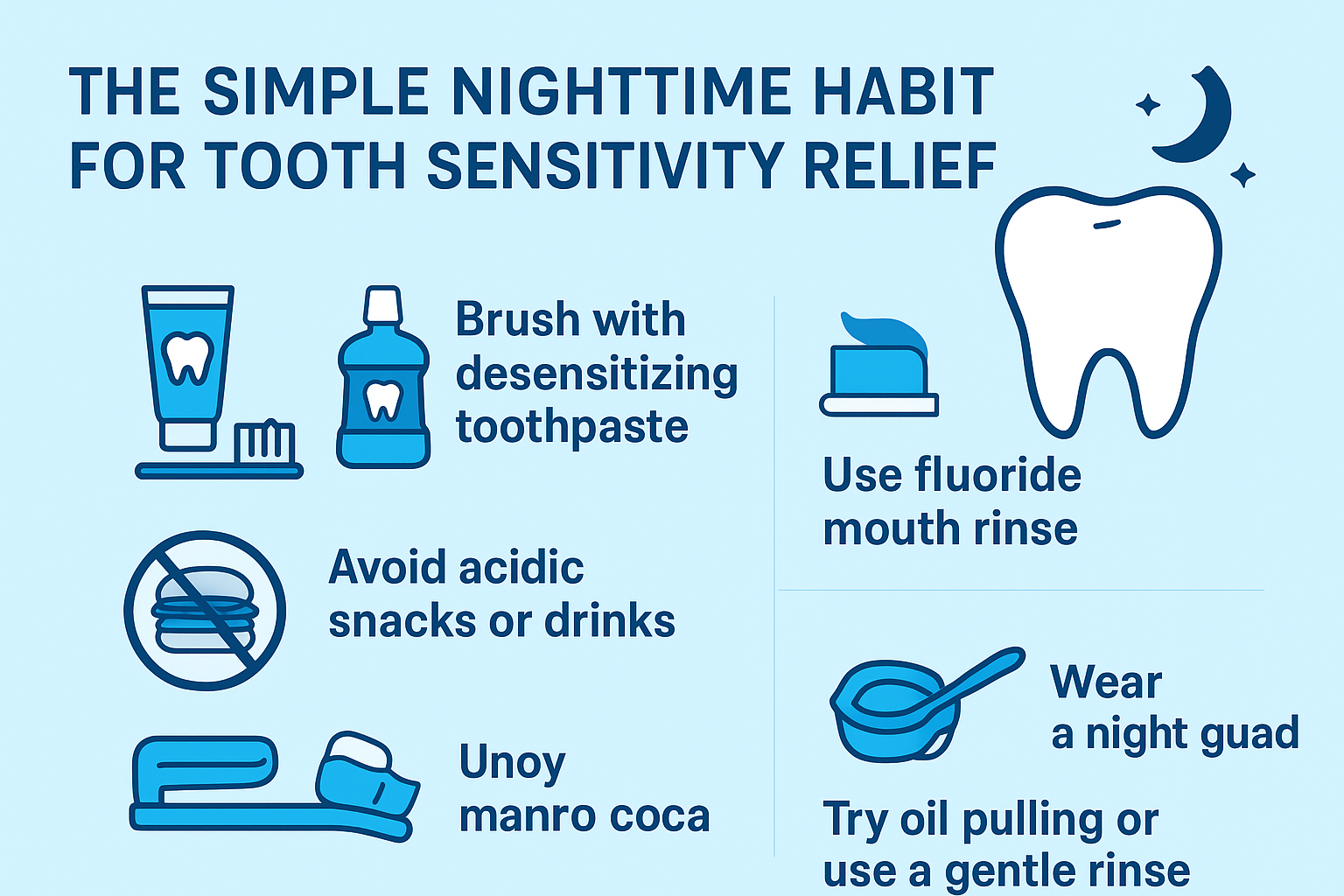
Nighttime habits for tooth sensitivity
Tooth sensitivity is one of the most common dental problems people face worldwide. That sharp twinge of pain when sipping water, brushing teeth, or breathing cold air can make life uncomfortable. Many people wonder: Is there something simple I can do at night to stop tooth sensitivity?
The good news is—yes! Practicing the right nighttime habit for tooth sensitivity can help reduce discomfort, protect enamel, and support natural healing while you sleep. In this article, we will cover everything laypeople need to know, from causes and habits to nighttime routines, products, and long-term prevention strategies.
What Is Tooth Sensitivity and Why Nighttime Care Matters?
Tooth sensitivity happens when the inner layer of the tooth (dentin) becomes exposed due to worn enamel or receding gums. Tiny channels in the dentin allow stimuli like hot, cold, sweet, or acidic foods to reach the tooth nerve, causing pain.
Nighttime care is crucial because:
- Saliva flow decreases while sleeping, making teeth more vulnerable.
- Acidic or sugary foods eaten during the day can continue damaging enamel overnight.
- Teeth grinding (bruxism) at night worsens sensitivity.
Thus, having a nighttime habit for tooth sensitivity is not just preventive—it’s essential for healing.
The Nighttime Habit for Tooth Sensitivity Relief
So, what’s the key? The most effective nighttime routine includes a gentle fluoride or desensitizing toothpaste application before bed, sometimes even leaving a thin protective layer overnight.
But beyond brushing, a complete habit involves:
- Brushing with Desensitizing Toothpaste at Night
- Use toothpaste with potassium nitrate or stannous fluoride.
- Brush gently with a soft-bristled toothbrush.
- Avoid rinsing immediately—let the paste stay on teeth for a protective coating.
- Fluoride Mouth Rinse Before Bed
- Strengthens enamel and reduces sensitivity.
- Alcohol-free fluoride rinses are gentler and safe for long-term use.
- Avoiding Late-Night Acidic Snacks or Drinks
- Lemon water, sodas, or spicy foods can erode enamel.
- If consumed, rinse with plain water before brushing.
- Using a Night Guard if You Grind Teeth
- Nighttime bruxism is a hidden cause of enamel wear and sensitivity.
- A dentist-fitted night guard cushions teeth and prevents damage.
- Oil Pulling or Saliva-Boosting Habits
- Coconut oil pulling (10 minutes before brushing) may reduce bacteria and sensitivity.
- Staying hydrated boosts saliva, your natural enamel protector.
Long-Term Benefits of a Nighttime Habit for Tooth Sensitivity
- Reduces pain while eating and drinking.
- Prevents enamel erosion.
- Helps gums heal and reduces recession.
- Supports natural remineralization during sleep.
- Improves oral comfort and sleep quality.
10 FAQs Not Covered in the Article
Q1. Can I use whitening toothpaste at night if I have sensitive teeth?
No, whitening toothpaste can worsen sensitivity. Use desensitizing toothpaste instead.
Q2. How long does it take for desensitizing toothpaste to work?
Most people notice relief within 2 weeks of consistent nighttime use.
Q3. Is sensitivity always permanent?
Not always—if caught early, proper care can reduce or reverse sensitivity.
Q4. Can sensitivity be linked to vitamin deficiency?
Yes, low calcium or vitamin D may increase enamel weakness and sensitivity.
Q5. Should I brush right after dinner or before sleeping?
Best practice is to brush right before sleeping. If you eat late, wait 30 minutes before brushing.
Q6. Can herbal toothpaste help nighttime sensitivity?
Yes, some with aloe vera, clove oil, or arginine may reduce mild sensitivity.
Q7. Is cold water brushing at night harmful for sensitive teeth?
Yes, always use lukewarm water when brushing if teeth are sensitive.
Q8. Can I use mouthwash without brushing at night?
Mouthwash alone is not enough; brushing is necessary for plaque removal.
Q9. Why does sensitivity feel worse at night?
Less saliva + bruxism + heightened nerve response in quiet environments make pain more noticeable.
Q10. Do sensitive teeth always need dental treatment?
Not always—mild sensitivity can be managed with habits, but persistent cases require a dentist.
Call to Action
Explore our Tooth Sensitivity Care Shop for essential products that provide lasting relief and protect your enamel.
Tooth Sensitivity Related Reads
Tooth Sensitivity After Filling: Causes, Duration, and How to Get Relief
The Causes of Tooth Sensitivity Revealed and Explained
Tooth Sensitivity Prevention and Treatment: Expert Strategies for Lasting Relief
Tooth Sensitivity Relief Toothpaste: The New Ingredient Dentists Are Excited About!
Bioactive Glass Toothpaste: Why Dentists Love This Sensitivity Relief Ingredient
When Your Toothache Not From a Tooth: Hidden Causes & Relief
Chewing Gum for Dentin Hypersensitivity: Can It Really Help Sensitive Teeth?
Foods That Cause Tooth Sensitivity: What to Avoid for a Pain-Free Smile
Whitening Toothpaste Sensitivity: What You Need to Know Before Your Next Brush
Teeth Sensitive After Scaling: Why It Happens and What You Can Do
Tooth Sensitivity After Cleaning — Normal or a Warning Sign?
Best Toothbrush for Sensitive Teeth: A Complete Guide to Gentle Brushing
Cold Weather Tooth Sensitivity: Why Your Teeth Hurt in Winter and How to Fix It
Sports Drinks Teeth Damage: What Every Athlete Needs to Know
Sparkling Water Teeth Health: Is It Really Safe or Slowly Harming Your Smile?
Pregnancy Sensitive Teeth: Causes, Relief, and When to See a Dentist
